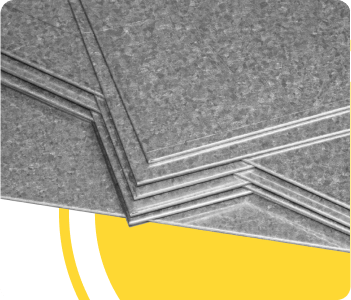Have Specs Ready? Send Us Your RFP for a Fast, Competitive Quote.
Save Big on 36×48 Sheets – Better Yields, Lower Shipping.
Shop Stainless Tubing – Huge Selection, Lower Shipping Rates.
Thinking about using carbon steel for your next project? It’s a smart, versatile choice—widely used in everything from construction to automotive to machine parts. To help you consider what you might need, here are five important factors when choosing carbon steel for your needs:
1. Carbon content affects strength and weldability
2. Know your grades: 1018 vs. 1045
Two of the most common carbon steel grades 1018 and 1045 offer you different benefits.
3. Heat treatment can take it to the next level
Carbon steel is highly responsive to heat treatment. Processes like quenching and tempering can enhance strength, improve wear resistance, or fine-tune mechanical performance depending on your end use.
4. Surface hardness
A feature of carbon steel is how it can be hardened on the outside while remaining tough and ductile inside. This makes it a go-to for parts like pins, bushings, and wear surfaces when long term durability is required.
5. It’s cost-effective, eco-friendly with protection
Carbon steel delivers outstanding value. It’s more affordable than many alloy steels while still offering the strength and versatility you need for a wide range of applications. It can be recycled too.
Carbon steel is prone to rust. You can prevent this to extend the life of carbon steel by applying oil coatings, painting, or prevent it from being exposed to moisture.
Some common uses for carbon steel:
How Online Metals Can Help You
Online Metals makes it easy to find exactly what materials you need. With the widest selection of carbon steel shapes and alloys in the U.S.. we deliver both to business and homes with no minimum orders. high tolerance custom cuts all supported by our first in class customer support, fast order processing, and economical on-time delivery.

Corrosion Resistant Carbon Steel Sheet!
Galvalume, Galvanized, and Galvanneal coatings are used to protect steel from rusting in an array of different climates.
Carbon steel is a strong and durable material made primarily of iron and carbon, with added elements in small amounts. Its high carbon content gives it excellent strength and hardness, making it suitable for various applications. Carbon steel is commonly used in construction, manufacturing, and energy industries for items like tools, machinery, structural components, and pipelines due to its cost-effectiveness and versatile properties.
We carry a wide variety of Carbon Steel alloys, including 1018, A36, A500, & 12L14.
High Strength
Durability
Cost-effective
Whether you're looking for hot-rolled steel for a structural project or cold-rolled steel for a more polished look, Online Metals has the carbon steel you need. You can buy carbon steel in a variety of shapes and alloys online and have it delivered directly to you. As one of the nation's top carbon steel suppliers, we offer standard and custom-cut lengths at prices that can't be beaten – with no minimums!
Yes, carbon steel can be susceptible to corrosion, especially in humid or corrosive environments. However, its resistance to corrosion can be improved through various methods, such as applying protective coatings, galvanizing, or using stainless steel alloys.
Carbon steel primarily consists of iron and carbon, while stainless steel contains iron, carbon, and a minimum of 10.5% chromium. This chromium content in stainless steel forms a passive oxide layer that provides excellent corrosion resistance, whereas carbon steel's lack of chromium makes it more prone to rusting.
Yes, carbon steel is commonly welded using various welding techniques. However, the welding process can alter the material's properties, affecting its strength and corrosion resistance near the welded area. Proper welding procedures and post-weld treatments are essential to maintain the desired characteristics.
Carbon steel's suitability for high-temperature applications depends on its carbon content and alloying elements. Low-carbon steel is often used in applications where moderate temperatures are involved, while higher carbon content can lead to improved heat resistance. Alloying elements like chromium, molybdenum, and nickel can enhance high-temperature properties in specific carbon steel alloys. However, for extremely high temperatures, specialized heat-resistant alloys might be preferred.